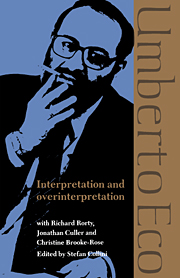7 - Reply
Published online by Cambridge University Press: 03 February 2010
Summary
Richard Rorty's paper represents an outstanding example of close reading of various texts of mine. Yet, if I were convinced by Rorty's reading I should say that it is ‘true’, thus casting in doubt his liberal attitude towards ‘truth’. Probably, to pay homage to such a reader, I should only react in the way he suggested and ask: What was your paper about? However, I admit that my reaction would reproduce the tiresome classical response to the sceptic's argument. And everybody knows that the good sceptic is entitled to react in terms of Orwell's Animal Farm: ‘OK, all interpreters are equal, but some of them are more equal than others.’
Besides, it would be unjust to ask what Rorty's paper was about. It was undoubtedly about something. It focussed on some alleged contradictions he found between my novel and my scholarly papers. In doing so, Rorty made a strong implicit assumption, namely, that there are family resemblances between different texts by a single author and that all these different texts can be seen as a textual corpus to be investigated in terms of its own coherence. Coleridge would agree, adding that such a tendency to identify the connection of parts to a whole is not a discovery of criticism, but rather a necessity of the human mind – and Culler has shown that such a necessity had also determined the writing of The Mirror of Nature.
I understand that, according to a current opinion, I have written some texts that can be labelled as scientific (or academic or theoretical), and some others which can be defined as creative.
- Type
- Chapter
- Information
- Interpretation and Overinterpretation , pp. 139 - 151Publisher: Cambridge University PressPrint publication year: 1992
- 4
- Cited by

